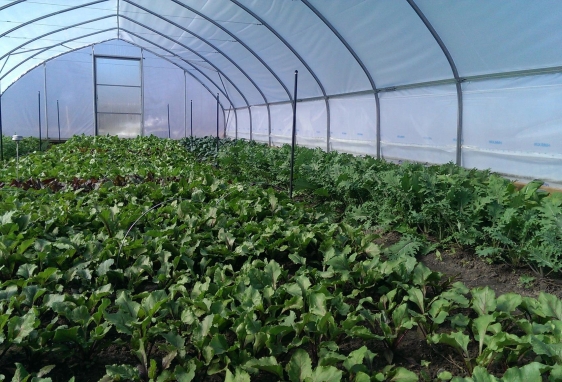Unheated high tunnel, or hoophouse, production is being practiced more widely because it is a profitable way to grow and sell year round. That requires extra attention to, and management of, soil health, as this Backyard Riches member explains.
Courtesy of Adithya Ramachandran, Kaleidoscope Vegetable Gardens, Dundurn SK, Canada
One of the challenges of high tunnel production is that there is no natural rainfall to leach the soil. Although I collect rainwater, it supplies only 20% of my high tunnel irrigation requirements. The other 80% comes from municipal water. So there are three main concerns I deal with.
1. Saskatoon city water, which supplies my farm, contains 142 ppm calcium/magnesium carbonates. Every inch of irrigation adds about 0.75 lb of lime per segment. At the rate of 1″ of irrigation per week for 6 months a year, this works out to 20 lbs of added lime per segment, which can raise the soil pH and cause production issues. To neutralize this, I till in 10 lbs of organic sulfur per segment per year.
2. Saskatoon city water contains 13 ppm of chloride and 2 ppm of chlorine. Chlorine reacts with soil organic matter to form chloride. Outdoors, this is leached by rainfall. In a high tunnel, this works out to 2 lbs of added chloride per segment over 6 months of irrigation. To counter this, I try to include beets or chard in the rotation at least once every two years. These crops can ‘mop up’ significant amounts of chloride.
3. Soil organic matter is consumed very rapidly in high tunnels. I add composted manure, compost and alfalfa meal at least twice per year to compensate.
CONTINUE THIS DISCUSSION IN THE FORUM > > >


